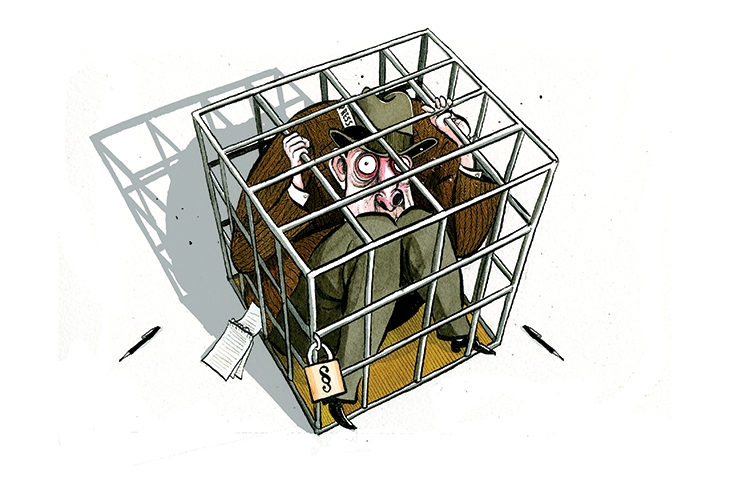Cynical old hacks like me have been amused by the chorus of establishment applause for the Mail on Sunday’s great Kim Darroch scoop. Our elected masters were outraged, rightly, by threats from the Met’s Assistant Commissioner Neil Basu to criminalise editors who publish leaked memos. Politicians left, right and centre condemned an assault on press freedom. Alan Rusbridger, saintly ex-editor of the Guardian, demanded to know what they taught budding bobbies in police college these days. ‘I would like to suggest a new and compulsory course,’ he said. ‘Let’s call it “The Basics Of Free Speech”. Lesson number one. The police do not tell newspaper editors what to write.’
Others piled in: Boris Johnson and Jeremy Hunt both defended newspapers’ right to publish. So did Labour’s John McDonnell and Emily Thornberry, claiming to be disgusted even though they support a second Leveson inquiry more draconian than the first. Everyone, it seems, is saying that the press must be free to publish information so long as it does not breach existing laws.
So where were our newfound champions the last time we went around this foetid mulberry bush? Seven years ago, dozens of innocent journalists had their lives put on hold — or careers destroyed — when they were not just threatened by police, but prosecuted on trumped-up charges. Anti–terror cops launched dawn raids, ripping up floorboards from their homes and tearing their cars’ innards apart.
One senior journalist was forced to stand by as police rummaged through the underwear drawer of his tearful 14-year-old daughter. Wedding photos, love letters and even Magic Roundabout DVDs were seized along with laptops and mobile phones.
There was precious little outrage from MPs then. Far from trumpeting about the ‘basics of free speech’, Mr Rusbridger and his newspaper seemed to enjoy watching the victims — including 21 of my colleagues from the Sun — being treated like criminals and bracing themselves for jail.
Interestingly, I did not hear the voice of Sir Keir Starmer, ex-director of public prosecutions, among those clamouring for press freedom this week. It was Sir Keir, a close ally of then PM Gordon Brown, who launched the witch-hunt. It is one reason why some of his fellow Labour MPs will never vote for him to be leader of their party.
It was Sir Keir’s team who put Fleet Street legend John Kay in the dock for breaking major stories, including the scandal over soldiers sent into battle against Taleban gunfire and roadside bombs protected only by canvas-topped Land Rovers.
Thanks to Sir Keir, our Whitehall editor Clodagh Hartley spent two years awaiting trial for revealing a snippet from Alistair Darling’s Budget. The stress led to her leaving journalism.
Nobody then spoke up about the casual abuse of police bail, which put the lives of innocent citizens on hold while callous cops toyed with their liberty. I want to stress here that I am not talking about phone-hacking, a clearly defined crime for which some News of the World journalists went to prison. This was about journalists doing their job, working in exactly the same way as Guardian staff, revealing to the public major news stories that the government preferred to conceal.
Nor am I alone in believing those criminal charges were trumped up. At an Appeal Court hearing Lord Thomas, Lord Chief Justice, asked prosecutors why they had kept changing the charges against the journalists. The CPS could not answer. This was the moment the infamous Elveden Persecution, the longest and costliest police operation in Scotland Yard’s history, began to disintegrate. In the end, all 21 Sun journalists were exonerated. The Lord Chief Justice ruled no crime may have been committed.
Lord Thomas’s words resonate today: ‘What concerns me is the freedom of the press and the desire of officials to contain information. We must ensure the press is protected. We can’t use criminal sanctions to undermine their position.’ He went on to declare that, while it might be an offence for a public official to sell information, it was not an offence for a newspaper to pay for it.
This was a landmark ruling, one that every police officer (and government minister) should be aware of. Yet Neil Basu’s threat to criminalise news-gathering suggests the police have learned nothing from Operation Elveden.
As for the politicians’ welcome support for the Mail on Sunday, would there have been such a furore if the emails had been rude about President Obama, not Trump?
Press freedom is under attack on manyfronts, from super-injunctions to the sour intolerance of the ‘You can’t say that’ snowflake generation. We cannot rely on MPs’ synthetic outrage to guarantee its survival.






Comments